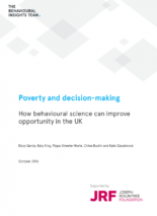The report puts forward a model of decision-making and applies it to three strategies for improving the lives of those living in or near poverty: minimising costs (choosing low cost credit; accumulating savings), maximising resources (moving into work from unemployment; accessing entitlements), and preventing intergenerational poverty (responsive parenting; applying to post-secondary education).
The model proposes that there are a set of resources which contribute to an individual’s chances of experiencing and escaping poverty. We call these resources ‘capital’. The six forms of capital we discuss are:
- Economic: income, wealth and government entitlements
- Human: child brain development and educational attainment
- Environmental: housing quality, safe neighbourhood and green space
- Social: social networks, social trust and freedom from stigma/stereotype threat
- Character: self-control, self-efficacy and motivation
- Cognitive: mental bandwidth and freedom from behavioural biases
Economic and human capital have historically been seen as direct causes of poverty but we propose that they also affect the decisions people make. For example, there is emerging research which shows that financial worries absorb mental capacity – or ‘bandwidth’ – needed for attention and problem solving. In addition, we bring together a wide range of studies from behavioural science to highlight that there are other types of capital that impact on poverty both directly and indirectly (via decision-making). We argue that understanding how these less tangible forms of capital influence decision-making is useful in two respects: First, it can help to explain why some well-intentioned interventions may fail; and second, it can open up a greater number of tools to address poverty.
